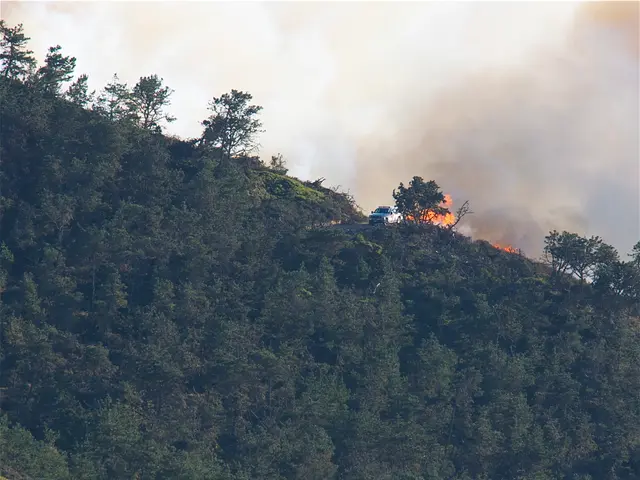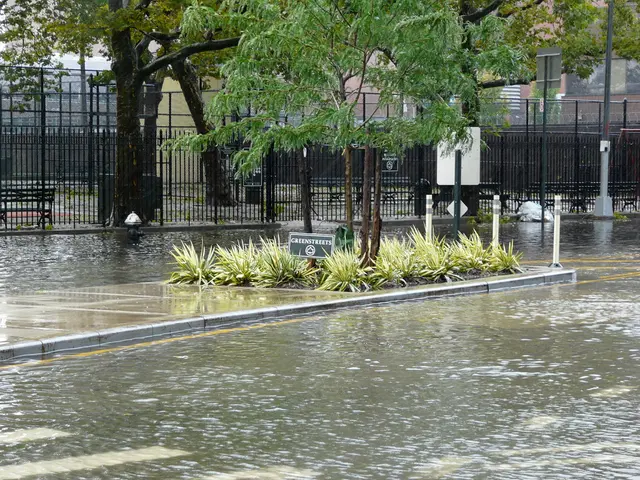Severe heatwave brings life to a standstill across France
France's 2025 Heatwave Intensifies, Spreading North and East
The ongoing heatwave in France is showing no signs of abating, with meteorologists predicting the extreme weather event to continue until at least the weekend. The heatwave, which started on June 19 and ended on July 4, was a previous instance of extreme weather in France, and this year's event is proving to be even more severe.
The heatwave is currently spreading to more regions, including the north and east. While parts of the northwest, such as Brittany and the English Channel coast, may be spared from the intense heat, with temperatures potentially reaching up to 28 degrees, other regions are bracing for record-breaking temperatures. On Monday, the temperature in Bordeaux reached a record-breaking 41.6 degrees, and Météo-France expects temperatures above 36 degrees in the Paris region and up to 40 degrees in the Rhône Valley. The highest heat warning level remains in place for the southeast, and an "exceptional" heat warning has been issued for these regions.
The ongoing heatwave is causing widespread fire risks, economic disruption, and health challenges. Record-breaking temperatures, such as the 40.9°C in Nîmes (the highest recorded since 1964), and peak temperatures reaching over 43°C in some departments, have affected large parts of southern and central France under red and orange alerts. Heat-related health risks, including increased drowning incidents as people seek relief in water, have been reported, along with exhausted workers and halted construction work during peak heat hours to protect employee safety.
Economically, the heatwave has forced shutdowns of nuclear reactors, such as in Gravelines and Bugey, due to overheating concerns and environmental protection, and caused disruptions in waste collection schedules and industrial productivity. Fire risks have escalated, with red alerts issued in several southern regions suffering from drought and high temperatures.
Measures taken by authorities include government-issued heatwave alerts, suspensions of outdoor work during extreme heat, newly designated cooling areas such as public pools and Seine river swimming zones, and public advisories to reduce energy consumption and protect vulnerable populations. However, the French ecological transition agency (Ademe) warns many buildings are unprepared for increasing heat, complicating adaptation efforts.
Experts attribute the increasing frequency and severity of heatwaves in France to human-induced climate change. The department of Rhône's ban on work on construction sites from 12 to 22 hours remains in effect, as part of efforts to protect workers from the extreme heat. The 2025 heatwave follows the 2003 event that killed thousands, underscoring the growing challenge climate change poses to public health, infrastructure, and the economy in France.
In summary, the 2025 heatwave in France is an example of escalating climate-induced extreme weather, prompting urgent adaptive responses and exposing vulnerabilities in energy use, urban planning, and public health. As the heatwave continues to spread, authorities are urging the public to take precautions and stay informed.
- The French government is urged to review and update both the community policy and employment policy to include provisions for addressing extreme weather events like heatwaves, considering the growing impact of climate change and its associated risks on public health, infrastructure, and the economy.
- Climate-change induced extreme weather events, such as the ongoing heatwave, should compel environmental-science scholars to invest more research into weather patterns and weather-forecasting, to better understand the effects of human-induced climate change and improve future predictions.
- With the severity of heatwaves increasing, it is crucial for the employment policy to address and accommodate the needs of workers dealing with record-breaking temperatures and heat-related health risks, especially in industries like construction and waste management.








